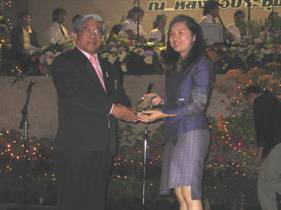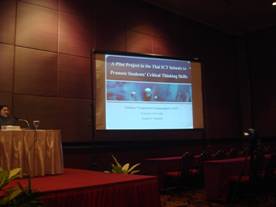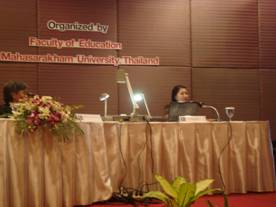Purpose of this study:
The purpose of this study was to investigate how effectively ICT was being used to support students’ critical thinking skills by ICT that was integrated into the teaching and learning in the elementary and secondary schools involved in the ICT Schools Pilot Project in Thailand. This exploratory study sought to examine to what extent these model ICT schools had classroom learning environments that were related to students’ critical thinking skills; and to what extent the classroom learning environments were associated with certain teacher characteristics.
Data Collection:
Data were collected from students and teachers who were in model ICT schools under the Thai ICT schools pilot project by means of interview surveys and computer-based classroom observations. Information on participants’ perceptions of their classroom learning environments with ICT was gathered through interviews with individual students and a few teachers. In total, 30 students and 5 teachers from 10 ICT schools had been interviewed. In addition, computer-based classroom observations in 22 classrooms from all 13 ICT schools had also been conducted.
Interview Findings:
Over half the student interviewees perceived that there was a relationship between their teachers’ personality characteristics and their interpersonal behaviour in both general and classroom environments with ICT. The particular quality, they emphasised was the ability to be a patient and a good listener, reflected in teachers being friendly, helpful, and giving time for personal discussion in and out class. There was acknowledgement by half the student interviewees, that teachers who established a supportive classroom environment, achieved higher student progress, by being more professional in regard to improving their students’ critical thinking skills within their learning and teaching process. Nearly a third of the student interviewees mentioned that logical teachers were more effective in developing students’ thinking abilities and skills.
Classroom Observation Findings:
The observation findings showed that the classrooms in which science, mathematics and computing were being taught gave the students a greater opportunity to reach the higher learning levels in Bloom’s Taxonomy than classrooms where other subjects were being taught. It could be argued that these subjects, by the very nature of their content, were more oriented to the higher order thinking skills. The fundamental importance of teacher characteristics was also apparent. Variations in teaching styles and methods, choice of instructional materials and the level of teachers’ professional and development, in terms of both ICT knowledge and skills and their understanding of levels of critical thinking, meant the difference between well managed and effective ICT classrooms where students reached the higher levels of critical thinking skills and those classrooms where ICT use was minimal and ineffective and students’ learning remained at basic levels of thinking.
It showed also be noted that in the analysis of the classroom observations, a lesson was classified as having achieved Bloom’s higher order critical thinking skills if it gave evidence of students carrying out activities involving analysis only. It was not necessary for the learning process to include synthesis and evaluation as well. In practice, these last two levels of higher order thinking skills were not observed very often.
Discussion:
Findings of the study assist to establish and enable the successful implementation of ICT integration in primary and secondary schools in Thailand. On the basis of the main research findings, recommendations are made for teaching roles to advance students’ learning.
The study’s findings have several important implications for school teachers through their teaching roles, (namely, to promote active and autonomous learning and increase more cooperative learning and assignments). Recommendations that can be made include:
Teachers must play the important role of facilitator, to provide rich environments, experiences, and activities for learning by incorporating opportunities for problem solving, authentic tasks, and shared knowledge and responsibility with their students in their classroom environments with ICT. This means that teachers’ roles must be changed from lecturer to consultant, guide, and resources provider. At best, the subject teacher is required to be a designer, director-actor, facilitator, or manager of student learning. This is consistent with the previous study by Marjanovic (1999, p. 129) who stated that teachers needed to transform their teaching roles from ‘information delivery specialists’ into ‘guides and facilitators of learning’. Teachers should not limit students’ rights to learn, but help them to link new information to prior knowledge, to refine their problem-solving strategies, and to learn how to learn.
The responses from the student interviews pointed to the need for professional teachers to develop their students’ critical thinking skills through collaborative group work in their class. When students worked as a team, they could help to support each other in relation to reducing their weaknesses, and increasing their depth of knowledge and understanding of skills. Statements from several students strongly expressed the view that they liked teachers who always assigned them to do group work, because it gave an opportunity to share and discuss different ideas with others. It led them to work effectively with others and develop better understanding during study hours. In addition, several participants identified the use of computers in the classroom for student group working, group presentation, or project work as being very helpful in presenting their work professionally. They started from gathering information through internet use, organising and analysing data to conduct a project report by word-processing and preparing handouts and sharing their work with others through Power Point presentation. They enjoyed the sense of having achieved a professional presentation. Therefore, subject teachers ought to work as managers of collaborative learning through brain storming sessions, group discussions, and other team-related activities during class hours.
Conclusion:
The overall findings showed that students could be assisted to learn critical thinking skills through integrating ICT into teaching and learning processes under the Thai ICT Schools Pilot Project. The present study concluded that successfully incorporating ICT into teaching and learning is fundamentally dependent on teaching roles (i.e., to promote active and autonomous learning and increase more cooperative learning and assignments).
In particular, the improvement of classroom learning environments with ICT involves the potential ways of providing effective and efficient instruction through both teachers’ and students’ integration of ICT into overall teaching and learning processes in the school classroom environments.
It is hoped that the findings of this study can stimulate future development and guide further improvements of classroom learning environments with ICT to enhance effective and efficient instruction that combines the roles of teachers’ and students’ learning into teaching and learning processes through the use of ICT.
References:
- Marjanovic, O. (1999). "Learning and teaching in a synchronous collaborative environment." Journal of Computer Assisted Learning 15: 129-138.
- Miles, M. B. and A. M. Huberman (1994). Qualitative data analysis: An expanded sourcebook. London, Sage.
- Office of the National Education Commission (1999). National Education Act of B.E.2542(1999). Bangkok, Office of the National Education Commission.
- Office of the National Education Commission (2002). Education in Thailand 2002/2003. Bangkok, Amarin Printing and Publishing.
- Office of the National Education Commission (2004). Education in Thailand 2004/2005. Bangkok, Office of the National Education Commission.
- Richards, T. and L. Richards (1995). Computer-Aided Qualitative Analysis. Using hierarchical categories in qualitative data analysis. D. Kelle. London, Sage Publications Inc: 80-218.
เมธินี วงศ์วานิช รัมภกาภรณ์
สาขาวิชาธุรกิจศึกษา ภาควิชาอาชีวศึกษา
คณะศึกษาศาสตร์ มหาวิทยาลัยเกษตรศาสตร์
โทร 02-942-8277 |
|



